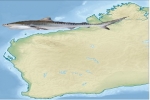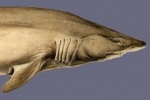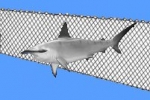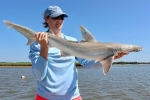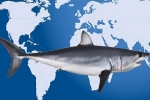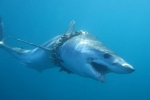Lemon sharks – live fast, die young
News Release Leibniz-Institute of Freshwater Ecology and Inland Fisheries (IGB) 29. July 2020 — — — — — — — Risk-taking individuals are expected to grow better but also die faster than the less explorative individuals. Such trade-offs can maintain multiple phenotypes in a population by allowing individuals with different behavioural strategies to achieve comparable
Cause for optimism over non-reef shark numbers off North West WA
Media Release Department of Fisheries, Western Australia 29. July 2020 — — — — — — — — — Reliable information for population assessments is rare for sharks, but fisheries researchers from the Department of Primary Industries and Regional Development (DPIRD) have been building a data rich study of non-reef species since 2002. The latest
Tagged sand tiger shark recaptured after 26 years in South Africa
News Release ORI TAG (Oceanographic Research Institute) 07. April 2020 — — — — — — —- — On the 13th March 2020 a day in history was made for the ORI – Cooperative Fish Tagging Project. Our 1 014th raggedtooth shark (Carcharias taurus) was recaptured after spending an incredible 9 591 days (26.2 years),
Recreational fishers catching more sharks and rays
Press Release The University of British Columbia Institute for the Oceans and Fisheries 27. January 2020 — — — — — — — — — Recreational fishers are increasingly targeting sharks and rays, a situation that is causing concern among researchers. A new study by an international team of scientists reveals that recreational catches of
Sharp increase in Ningaloo whale shark injuries might be due to boat encounters
Press Release Australian Institute of Marine Science 24. January 2020 — — — — — — — — — — — — Scarring and major lacerations due to vessel collisions becoming more common, study finds. Almost one-fifth of the whale sharks (Rhincodon typus) in Western Australia’s Ningaloo Reef Marine Park show major scarring or fin
Shark nets destructive and ineffective, study finds
Press Release University of Wollongong Australia (Story by Benjamin Long) 04. December 2019 — — — — — — — — — — — — A new study that looks at both the effectiveness of shark nets in keeping beachgoers safe and their destructive impact on marine life has concluded that their use should be
Shark proof wetsuit material could help save lives
Press Release Flinders University, South Australia 20. November 2019 — — — — — — — — — — — A new wetsuit material tested by Flinders marine researchers can help reduce blood loss caused by shark bites, to reduce injuries and prevent the leading cause of death. The study published in Plos One tested
Bonnethead sharks subject of newly funded research
Press Release South Carolina Department of Natural Resources 03. October 2019 —- —- —- —- —- —- —- —- If you fish on the South Carolina coast, chances are you’re no stranger to the bonnethead shark. These small, unusual members of the hammerhead family are one of the most common shark species caught both on
Basking sharks exhibit different diving behavior depending on the season
Press Release University of Exeter 26. September 2019 — — — —- —- — Tracking the world’s second-largest shark species has revealed that it moves to different depths depending on the time of year. Basking sharks spend most of the summer months at the ocean’s surface, but dive to deeper depths in winter. This seasonal
Shark pups lose gains in stressed environments
Media Release ARC Centre of Excellence for Coral Reef Studies 17. September 2019 — — — — — — — — — — A prominent JCU shark researcher is part of an international team that found shark babies can’t reach their physical peak if they’re born into environments degraded by human-induced stressors, including climate change.
Decline in tiger shark population defies expectations
Press Release Griffith UniversityAuthor: Deborah Marshall 10. September 2019 —– —— —– —– —- — New Griffith University research has revealed a 71% decline in tiger sharks across Queensland’s coastline. “This has been particularly rapid in southern regions which is unusual,’’ says lead author Dr Chris Brown from the Australian Rivers Institute. “Tiger sharks are
Blue Sharks Use Eddies for Fast Track to Food
News Release Woods Hole Oceanographic Institution 07. August 2019 — — — — — — — — — — — Blue sharks use large, swirling ocean currents, known as eddies, to fast-track their way down to feed in the ocean twilight zone—a layer of the ocean between 200 and 1000 meters deep containing the largest
Mastering metabolism for shark and ray survival
Press Release The University of Queensland 01. August 2019 — —- — —- —- —- —- —- —- Understanding the internal energy flow – including the metabolism – of large ocean creatures like sharks and rays could be key to their survival in a changing climate, according to a new study. University of Queensland PhD
Industrialised fishing overlaps threatened shark hotspots worldwide
Press Release The Marine Biological Association (MBA) 24. July 2019 —- —- —- —- —- — — — Major high seas fishing activities are centred on ecologically important shark hotspots worldwide North Atlantic blue sharks and shortfin mako – the fastest shark in the sea – have on average 76% and 62% of their space
Hundreds of sharks and rays tangled in plastic
Press Release University of Exeter 5. July 2019 — — — — — — — — — — Hundreds of sharks and rays have become tangled in plastic waste in the world’s oceans, new research shows. University of Exeter scientists scoured existing published studies and Twitter for shark and ray entanglements, and found reports of


